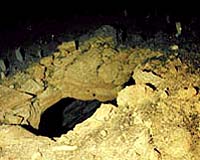| . |  |
. |
Dhaka (AFP) June 14, 2009 A controversial global treaty to clean up the ship recycling industry will mean a boom in business for the Bangladeshi magnates whose workers pull the often toxic vessels apart, experts say. The International Maritime Organisation (IMO) agreement on ship-breaking was signed last month by 65 countries, and business leaders say the deal finally legitimises their work and should herald major growth for the sector. But trade unionists and environmentalists have criticised the treaty for failing to address the serious dangers faced by workers and the pollution that the industry causes. About 25,000 men are employed on the Sitakundu coastline of south-east Bangladesh, exposed to dire conditions and the risk of poisoning from asbestos, mercury and other substances. Ships are driven into the 10-kilometre (six-mile) stretch of beaches on high tides and then taken apart, with their steel recycled for uses such as construction. "Around a dozen new companies are popping up here," Enam Ahmed, technical head of the Bangladesh Shipbreakers Association, told AFP from Sitakundu. "Yards that have been dormant for years are bouncing back to life. There's a sense a boom time is coming with more ships heading our way. The new treaty recognises the way we work." The agreement set up by the IMO, which is part of the United Nations, requires ship-owners to provide an inventory of hazardous materials before a vessel is sent for scrapping. It also orders bosses to improve safety procedures for workers, dozens of whom are reported to die every year in accidents. Nevertheless, the treaty "will give legitimacy to the way Bangladeshi entrepreneurs break ships at Sitakundu," said Bazlur Rahman, head of the government's shipping department. "It'll tremendously boost growth and remove the stigma attached to it (ship-breaking)." With no iron ore, Bangladesh is dependent on the recycled steel for its fast growing economy -- and 45 per cent of all global ship-breaking is undertaken in the country. But environmentalists have slammed the IMO deal, saying it effectively supports an industry that exacts a terrible toll on men and the coastline. "No doubt Bangladeshi ship breakers will be delighted at the deal. But it legalises some of the worst environmental and labour practices in the world," said Mohammad Ali Shahin, local head of the Platform on Shipbreaking campaign. He said Bangladeshi shipbreakers dumped an average five tonnes of toxic sludge -- such as mercury and asbestos -- for every ship dismantled. Last year the shipping department said 200 ships were pulled apart in Bangladesh. "Each ship brought toxic waste, which was dumped in the water, polluting the entire beach. We have done studies and found it to be a leading cause of deaths of workers," he said. But Ahmed, who represented the country's ship breaking industry when the deal was struck in Hong Kong last month, said the treaty proved that the business was doing nothing wrong. "We're aware of the concerns about beaching. But it's not the hazardous practice that some claim it is. It does not destroy beaches," he said. Ahmed says the agreement was a breakthrough for Sitakundu, which for years has faced the threat of being shut down by environmental lobby groups. The IMO said the deal would ensure that ships did "not pose any unnecessary risk to human health and safety or to the environment" as they were taken apart. The new rules also say about 1,000 single-hull oil tankers currently at sea must be mothballed by 2010 -- a deadline that means more business for Bangladesh. "This will create 50,000 new jobs in scrap yards and in steel mills which melt dismantled ship plates," Ahmed said. "It'll help Bangladesh beat the recession." Share This Article With Planet Earth
Related Links Our Polluted World and Cleaning It Up
 Bacteria From The Deep Can Clean Up Heavy Metals
Bacteria From The Deep Can Clean Up Heavy MetalsLondon, UK (SPX) Jun 12, 2009 A species of bacteria, isolated from sediments deep under the Pacific Ocean, could provide a powerful clean-up tool for heavy metal pollution. Writing in the current issue of the journal, Microbiology, Professor Gejiao Wang and his colleagues from Huazhong Agricultural University in Wuhan, PR China describe how a particular strain of Brachybacterium, strain Mn32, proved to be highly effect ... read more |
|
| The content herein, unless otherwise known to be public domain, are Copyright 1995-2009 - SpaceDaily. AFP and UPI Wire Stories are copyright Agence France-Presse and United Press International. ESA Portal Reports are copyright European Space Agency. All NASA sourced material is public domain. Additional copyrights may apply in whole or part to other bona fide parties. Advertising does not imply endorsement,agreement or approval of any opinions, statements or information provided by SpaceDaily on any Web page published or hosted by SpaceDaily. Privacy Statement |